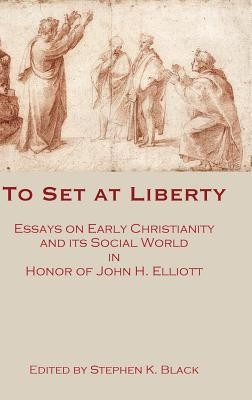
- We will send in 10–14 business days.
- Publisher: Sheffield Phoenix Press Ltd
- Year: 2014
- Pages: 412
- ISBN-10: 190753492X
- ISBN-13: 9781907534928
- Format: 15.6 x 23.4 x 2.4 cm, hardcover
- Language: English
- SAVE -10% with code: EXTRA
To Set at Liberty (e-book) (used book) | bookbook.eu
Reviews
Description
John H. (Jack) Elliott, Professor Emeritus of Theology and Religious Studies at the University of San Francisco, is one of the founding fathers of social-scientific criticism and its application to biblical interpretation as well as to the interpretation of other ancient literature. In this tribute 21 well-known practitioners of social-science criticism build on and advance various aspects of Elliott's work and methodology. Norman Gottwald retraces the evolution of social scientific criticism and its significance, David Aune examines the term magic as a socio-religious category, Scott Bartchy writes on Paul's tenuous authority in Corinth, Alicia Batten looks at the characterization of the rich in the epistle of James, Stephen Black studies the ethnic identity of John Chrysostom's congregation in fourth century Antioch, Zeba Crook explores memory theory in Luke's gospel, Richard DeMaris applies ritual studies to Mark's gospel, Jonathan Draper examines the role of purity and pollution in the story of the Rich Man and Lazarus, Dennis Duling explores smell as a neglected dimension of social scientific studies in ancient and biblical literature, Philip Esler looks at the possible role of Psalm of Solomon 17 in the death of Jesus, David Horrell re-examines aspects of the social strategy of 1 Peter, Ralph Klein explores attitudes to imperial authority in Bel and the Dragon and Daniel, Stuart Love applies anthropological studies on spirit aggression to Luke's gospel, and James Mackey challenges traditional theological notions of Jesus' divine identity as well as traditional historical interpretations of Jesus' trial. In other chapters, Bruce Malina examines the term 'author' and questions its appropriateness as a term for ancient writers, Halvor Moxnes looks at the historical Jesus beyond the traditional ethnic and nationalist identity models that have informed scholarship on the subject, John Pilch establishes a model for understanding the social and psychological development of ancient figures like Jesus, Richard Rohrbaugh looks at the role of genealogy in the New Testament and its world, Herman Waetjen argues that the Jubilee stands as background and context in the parable of the wicked tenants, Robert Wilken demonstrates the role and use of 1 Peter 2.13-17 in second century martyr accounts, and Ritva Williams advocates an ideological critique in examining the parable of the shrewd steward.
EXTRA 10 % discount with code: EXTRA
The promotion ends in 19d.12:23:34
The discount code is valid when purchasing from 10 €. Discounts do not stack.
- Publisher: Sheffield Phoenix Press Ltd
- Year: 2014
- Pages: 412
- ISBN-10: 190753492X
- ISBN-13: 9781907534928
- Format: 15.6 x 23.4 x 2.4 cm, hardcover
- Language: English English
John H. (Jack) Elliott, Professor Emeritus of Theology and Religious Studies at the University of San Francisco, is one of the founding fathers of social-scientific criticism and its application to biblical interpretation as well as to the interpretation of other ancient literature. In this tribute 21 well-known practitioners of social-science criticism build on and advance various aspects of Elliott's work and methodology. Norman Gottwald retraces the evolution of social scientific criticism and its significance, David Aune examines the term magic as a socio-religious category, Scott Bartchy writes on Paul's tenuous authority in Corinth, Alicia Batten looks at the characterization of the rich in the epistle of James, Stephen Black studies the ethnic identity of John Chrysostom's congregation in fourth century Antioch, Zeba Crook explores memory theory in Luke's gospel, Richard DeMaris applies ritual studies to Mark's gospel, Jonathan Draper examines the role of purity and pollution in the story of the Rich Man and Lazarus, Dennis Duling explores smell as a neglected dimension of social scientific studies in ancient and biblical literature, Philip Esler looks at the possible role of Psalm of Solomon 17 in the death of Jesus, David Horrell re-examines aspects of the social strategy of 1 Peter, Ralph Klein explores attitudes to imperial authority in Bel and the Dragon and Daniel, Stuart Love applies anthropological studies on spirit aggression to Luke's gospel, and James Mackey challenges traditional theological notions of Jesus' divine identity as well as traditional historical interpretations of Jesus' trial. In other chapters, Bruce Malina examines the term 'author' and questions its appropriateness as a term for ancient writers, Halvor Moxnes looks at the historical Jesus beyond the traditional ethnic and nationalist identity models that have informed scholarship on the subject, John Pilch establishes a model for understanding the social and psychological development of ancient figures like Jesus, Richard Rohrbaugh looks at the role of genealogy in the New Testament and its world, Herman Waetjen argues that the Jubilee stands as background and context in the parable of the wicked tenants, Robert Wilken demonstrates the role and use of 1 Peter 2.13-17 in second century martyr accounts, and Ritva Williams advocates an ideological critique in examining the parable of the shrewd steward.


Reviews